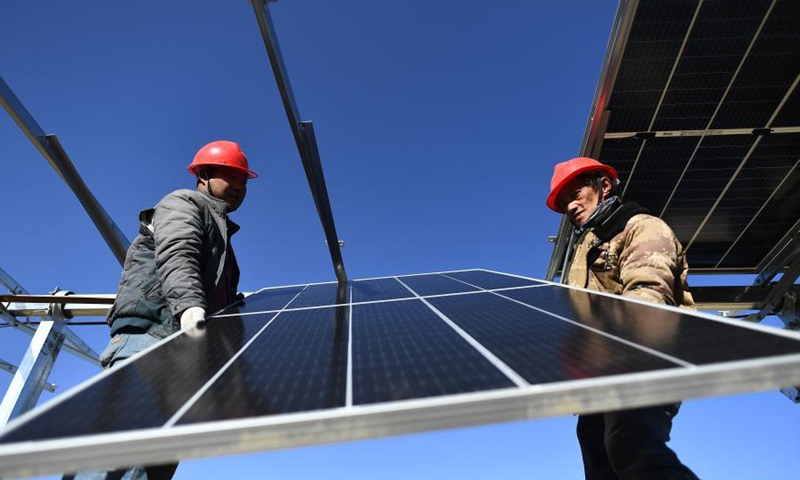Surging heating demand, output shortfalls lead to tight power supplies in China
By GT staff reporters Source: Global Times Published: 2020/12/17 21:23:40

Workers install a solar power unit at the construction site of a 300-MW photovoltaic electricity project of the China Datang Corporation Ltd. in Gonghe County, Tibetan Autonomous Prefecture of Hainan in northwest China's Qinghai Province, Dec. 15, 2020. (Xinhua/Zhang Hongxiang)
Several provinces in China announced that electricity loads have increased rapidly and issued proposals to save electricity and start its orderly use.
Analysts said that as China enters the coldest season, heating demand is surging while there is a temporary supply shortage, for many reasons. As China mainly uses coal for electricity, a shortage in coal has also dragged down the supply of electricity.
Growth of industrial production and low temperatures have led to a surge in power demand beyond expectations. So far, electricity supply has remained stable, leaving residents unaffected. China has taken measures to ensure power supply, said China's top economic planner on Thursday, the Xinhua News Agency reported.
The power load of the electricity grid in East China's Jiangxi Province reached a new high on Monday, prompting Jiangxi's economic planners to interrupt the power supply of some users during peak hours from Tuesday.
Other provinces, including East China's Zhejiang Province and Central China's Hunan Province, also moved to conserve electricity, and called on business users to provide their own emergency power supply. In the southern part of China, people mainly use electric appliances such as space heaters and air conditioners for heating.
A director of the China Renewable Energy Society, who declined to be identified, told the Global Times on Thursday that China actually has a tiny surplus of electricity, and electricity rates have been falling. The shortage of power in several provinces will be short-lived.
"The main reason for the electricity shortages is the sudden drop in temperatures in the south, which has led to a surge in demand for electricity and affected supply. In the south, due to high humidity and low temperatures, freezing rain easily forms, and it will affect power towers and transmission lines, and therefore power transmission.
"Extreme weather also affects wind turbines, hydropower plants and photovoltaic power facilities," said the director.
Other analysts also attributed the electricity shortage to cold weather.
"In very cold and wet weather, the blades of wind turbines can be frozen and stop working. The low temperatures in the south must have an effect on electrical components, making the performance sub-optimal," Sheng Honglei, an electricity industry insider based in Beijing, told the Global Times on Thursday.
The relative lag of generating capacity is an important reason for the power supply gap in Hunan, according to a notice of the Hunan government in November.
China's electricity is mainly provided by thermal power stations that use coal. Wind power only accounts for about 10 percent, according to the director.
An officer of the government of Wenzhou, East China's Zhejiang Province, said that government departments have been ordered to conserve energy and limit power. But Wenzhou's power supply to businesses and households should be no problem.
An employee at the Xianning National High-tech Industrial Development Zone in Central China's Hubei Province told the Global Times that there is no problem with electricity supply to enterprises in the zone.
Hubei said in August that it would guarantee electricity to households ahead of enterprises.
"At present, coal stored in China will cover the nation's use for 21 days. This winter, the strong demand for coal used in heating, power, steel, building materials and other industries, has increased more significantly than in previous years," said Meng Wei, spokesperson of the National Development and Reform Commission, on Wednesday.
As of November 30, the thermal coal inventory in Hunan was down by 18.5 percent on a yearly basis, per Hunan government.
"Coal mine accidents in China have limited the output of coal in the main producing areas. In addition, coal imports continue to shrink, causing coal prices to continue to surge," a Beijing-based energy industry analyst told the Global Times on Thursday.
Coal imports in November stood at 11.67 million tons, down 43.8 percent year-on-year, according to statistics from the General Administration of Customs.
Newspaper headline: Tight power supplies reflect heating demand in winter